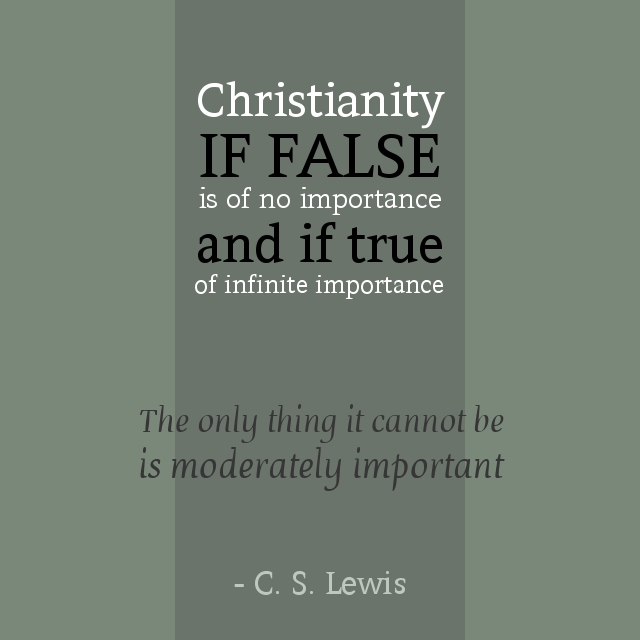So, as I mentioned a couple weeks ago, we’re going to be taking a step back from the “Seek the things above” series, and asking a series of questions that are very fundamental. Is it possible to know the truth about God? Does he even exist at all? Is there even just one truth – or are all beliefs equally true? After all, why should we listen to the Bible at all if we don’t even know if there is any deity at all … much less whether the Bible itself is true?

I think C. S. Lewis makes an excellent point here. If the Bible is not true, then it is of no importance. And if it is true, it is utterly important. The one thing it cannot be is moderately important.
But can we know which it is? Or is it true for some people and not true for others? Is it only a matter of a faith? And is faith just another word for religious opinion and preference?
We’ll start with those last two questions today, because if it is “just a matter of faith”, and faith is just subjective opinion and preference, then there is no way to ever come to a definitive conclusion, except on a purely personal level. We might as well be trying to discuss what is the best pizza topping – you might think one thing, and I might think another, and it is just a matter of opinion.
So, what is faith? Faith, at its most basic form is just trust or confidence in something which a person has not experienced first hand. I would like to point out that faith is not limited to religion. A person can have faith in the God of the Bible – he has not seen God personally, but he believes that he exists. A person can have faith in evolution – he did not personally watch one animal evolve into another, but he believes that it happened. A person can have faith in scientists having all the answers – he has not seen scientists answer every single question, but he believes they could. A person can have faith in polytheism – he has not seen multiple gods with his own eyes, but he believes they exist. And so forth and so on. A person can have faith in any number of things. But any world view you choose to take involves some amount of faith, because they all involve aspects which cannot be experienced firsthand and must therefore be taken on faith.
If someone disagrees with the above paragraph, it is probably because they would argue that some of those are based on evidence and some are not. First of all, there is a difference between evidence and proof. None of these worldviews can be absolutely proven – if one of them could be proven then none of the others would have a leg on which to stand. But secondly, there is certainly a difference between having a blind faith and having a faith based on evidence. To have a blind faith is to believe something simply because you decided to believe it, and for no other reason. But, again, blind faith is not limited to religion. Certainly, many people have a blind faith in religion, but many people also have a blind faith in many other things. Either way, having a completely blind faith is not healthy. To have a faith based on evidence, a person needs to examine the evidence and come to a conclusion as a result, and from that they can then have faith. But in all of these things we are talking about evidence, not proof, which is why it is faith. We can’t travel back to the beginning of time and simply watch and see what happened, and experience that first hand. But there IS evidence for what did happen, and the goal is to examine the evidence and reach the most reasonable conclusion, and have faith based on that conclusion.
To sum up, faith is a trust or confidence in something which we have not experienced firsthand. A healthy faith should be based on evidence. So as we start to examine a variety of questions in this series, we cannot dismiss the questions by simply saying, “Well, it is just a matter of faith,” because it is not that a purely subjective faith should be basis for the answers – but rather it is the evidence and the resulting answers that should be the basis for faith.
Leave your thoughts and comments below!


Great explanation April!
Thanks Heather! :)
VERY good points/observations on the word ‘faith’. Look forward to the future posts on it.
I appreciate your comment, Roger! :)
APRIL; I think this is a wonderful idea. I try to get a Biblical thought or scripture posted each day. FAITH is certianly the HEART BEAT of our belief, and our actions in relation to our belief. The Hewbrew writer wrote , ( attributed to the apostle Paul ) ” Now faith is the assurance of things hoped for, and the conviction of things not seen”. Looking forward to reading your future comments. BILL GOWEN
Thanks so much for your input!
beautiful words and wonderful description! Can’t wait to see more of this series :-)
Thanks Lizzy! I’m looking forward to going through it … as they say, when you set out to study and explain something, the person who learns the most is yourself!
Thanks for the weekly posts on this topic! So encouraging! And I love the CS Lewis quote :]